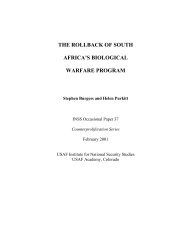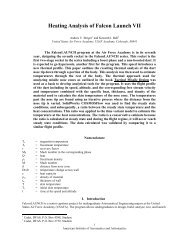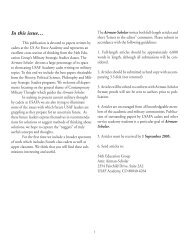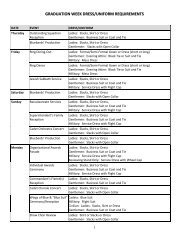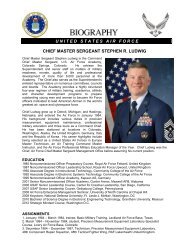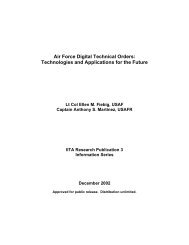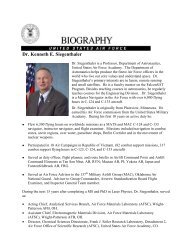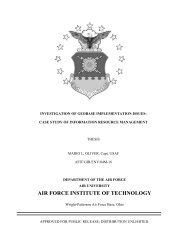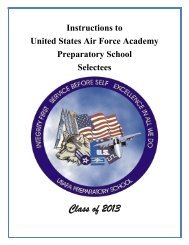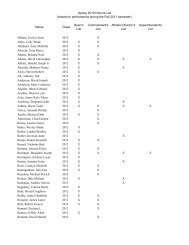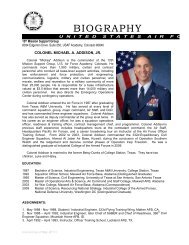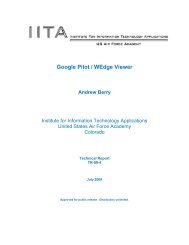Military Professionalism - United States Air Force Academy
Military Professionalism - United States Air Force Academy
Military Professionalism - United States Air Force Academy
You also want an ePaper? Increase the reach of your titles
YUMPU automatically turns print PDFs into web optimized ePapers that Google loves.
hierarchic, orderly, technical culture, they have decidedly mixed records at the open and<br />
chaotic business of running for office and governing. There are exceptions, no doubt, to<br />
the rule that generals make poor political activists. Who would want to exclude<br />
Eisenhower from American politics? Then again, does anyone really think there is an<br />
Eisenhower out there? And are the records of Grant, MacArthur, LeMay and<br />
Westmoreland so inspiring that retired flags should be encouraged to plunge into politics?<br />
Gelpi, Christopher and Peter D. Feaver. “Speak Softly and Carry a Big Stick?<br />
Veterans in the Political Elite and the American Use of <strong>Force</strong>.” The American<br />
Political Science Review 96.4 (Dec. 2002): 779-794.<br />
Other research has shown that civilians and the military differ in their views about when<br />
and how to use military force; that the opinions of veterans track more closely with<br />
military officers than with civilians who never served in the military; and that U.S. civilmilitary<br />
relations shaped Cold War policy debates. The authors assess whether this<br />
opinion gap "matters" for the actual conduct of American foreign policy. They examine<br />
the impact of the presence of veterans in the U.S. political elite on the propensity to<br />
initiate and escalate militarized interstate disputes between 1816 and 1992. As the<br />
percentage of veterans serving in the executive branch and the legislature increases, the<br />
probability that the <strong>United</strong> <strong>States</strong> will initiate militarized disputes declines. Once a<br />
dispute has been initiated, however, the higher the proportion of veterans, the greater the<br />
level of force the <strong>United</strong> <strong>States</strong> will use in the dispute. [PUBLICATION ABSTRACT]<br />
Shalikashvili, John M. “Old Soldiers Don’t Have to Fade Away.” The Wall Street<br />
Journal (Eastern Edition), (Aug. 17, 2004): A.19.<br />
Allowing officers to vote in elections has not undermined the political impartiality of the<br />
military in the execution of its duties. Active duty officers should not cross the line into<br />
politics, outside of the act of voting. When officers retire they share the same<br />
responsibility as private citizens to participate responsibly in the political process.<br />
Retired officers can publicly endorse candidates so long as they are clear that they are<br />
speaking based on their individual opinions, not the views of the military.<br />
Strong, Steven T. Politicians in the Ranks. Strategy Research Project. Carlisle<br />
Barracks: U.S. Army War College, 2005.<br />
http://handle.dtic.mil/100.2/ADA434870<br />
This paper walks through the various laws regulating the role that active duty and retired<br />
military officers can play in politics and recommends changes.<br />
68




